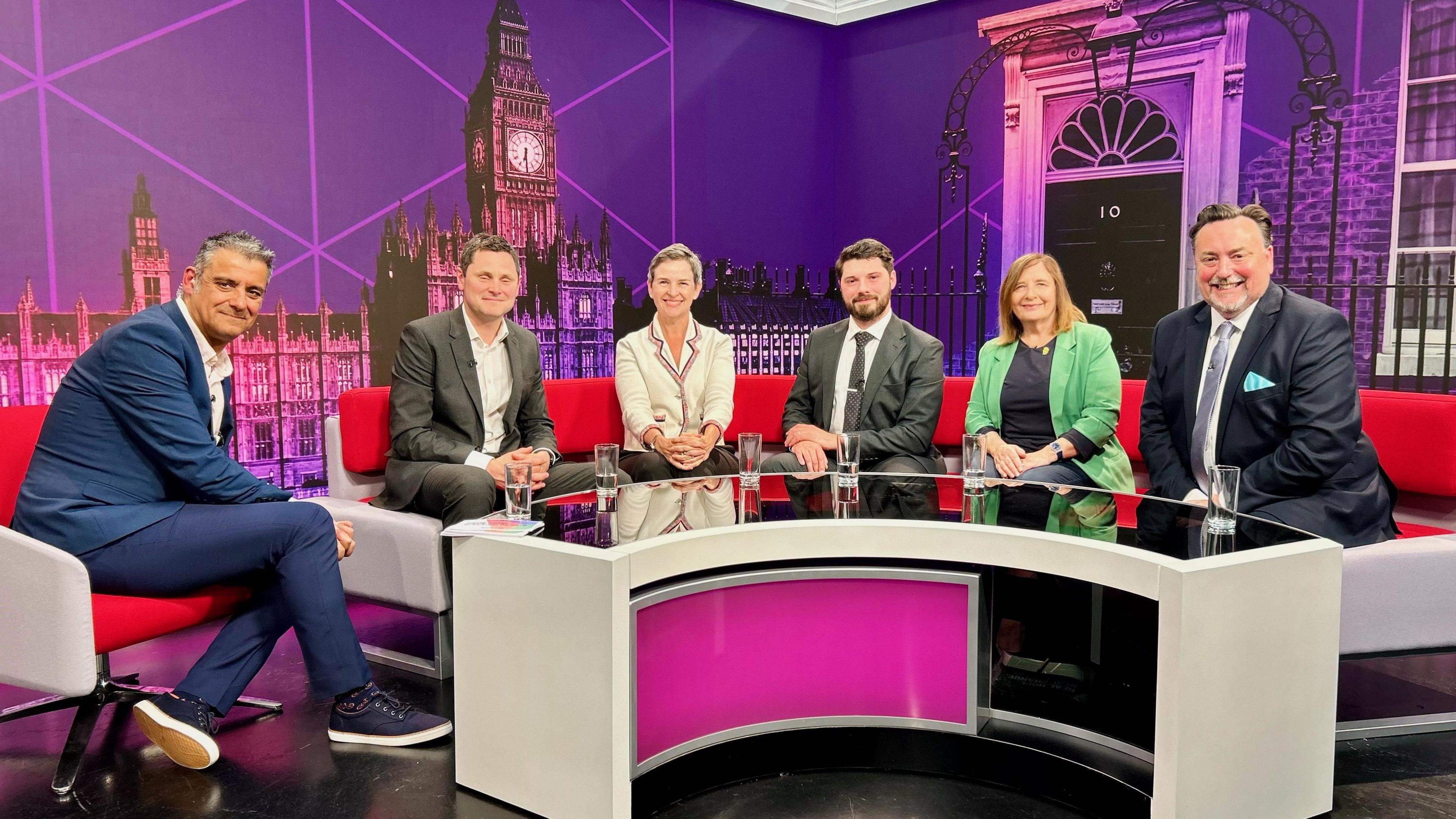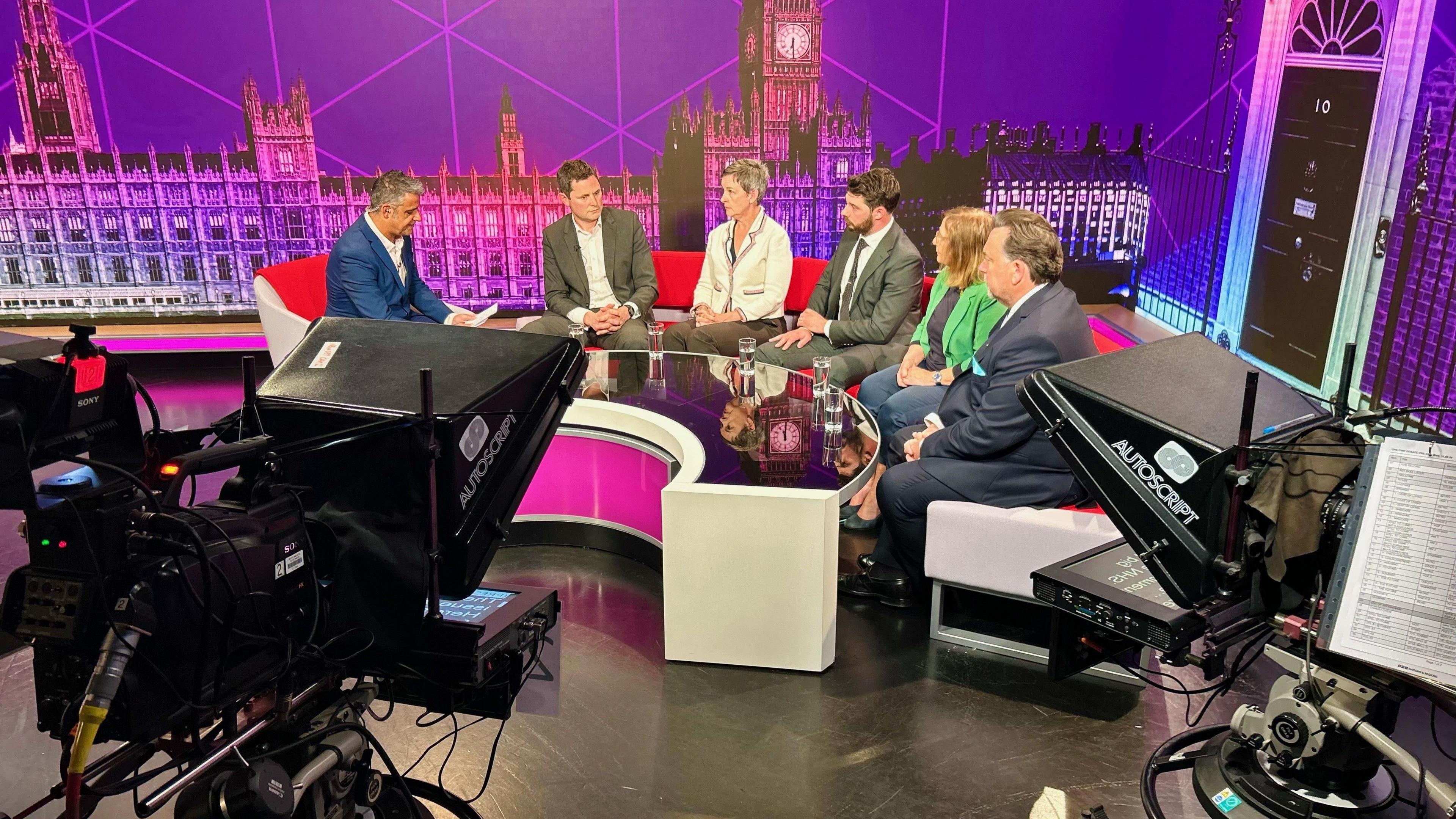Seven takeaways from BBC CWR’s election debate

BBC CWR's Phil Upton pictured with general election candidates Tom Mercer, Mary Creagh, Louis Adam, Alix Dearing and James Crocker
- Published
General election candidates from across Coventry and Warwickshire have gone head-to-head in debate hosted by BBC CWR.
Discussions covered key themes that came up in messages submitted through the BBC’s Your Voice, Your Vote.
The cost of living, the NHS, housing and education were among the issues on the agenda.
But what did we learn? Here are seven takeaways - and you can also watch the debate on iPlayer.
Cost-of-living blame game
A period of economic turmoil followed the Conservative's mini-budget in 2022, which led to the resignation of Liz Truss, after serving as the shortest-serving prime minister in UK history.
So, aren’t the Tories partly responsible for the cost-of-living crisis?
“Mistakes were made, for sure,” said Tom Mercer, the Conservative candidate in Coventry North West. But he said inflation had dropped to 2% and the main drivers of high living costs were the pandemic and the war in Ukraine.
Labour candidate in Coventry East, Mary Creagh, said her party’s “number one priority was to tackle the cost-of-living crisis” and get the economy growing.
Louis Adam, the Liberal Democrat candidate in Warwick and Leamington, said his party’s policies on boosting the economy and jobs “would help people with the cost of living”.
The Green candidate in Kenilworth and Southam, Alix Dearing, said her party’s proposal of a wealth tax of 1% a year on assets of over £10m would ease living costs.
And James Crocker, Reform UK’s candidate in Stratford-on-Avon, blamed high inflation on “a vast increase in the money supply in the UK and the US”.
Should NHS reform be a cross-party issue?
Long waits for treatment and a lack of GP services are among the complaints about the NHS that have been put to the BBC.
Ms Creagh said Labour would “end the scramble to get a GP appointment” and fund some of its NHS plans by closing what she called “tax loopholes”.
Somewhat unusually for a political debate, Mr Adam punctured the tribalism for a moment, by suggesting all parties should be working together towards a long-term solution to fund the care system.
Ms Dearing agreed and suggested a wealth tax could be part of that solution. “Many wealthy people don’t mind paying more tax,” she said.
NHS waiting lists for hospital treatment rose to a record of nearly 7.8 million in September 2023 - and that’s an awkward statistic for the Conservatives.
Mr Mercer compared NHS waiting lists to turning around a tanker, and again blamed the pandemic for the backlog.
And the Reform UK candidate said we was comfortable with private sector involvement in the NHS and encouraging people on middle incomes to “use the independent sector where they can”.

Candidates standing in constituencies across Coventry and Warwickshire discussed the cost of living, housing and education and the NHS
Few solutions to SEND struggles
Labour leader Sir Keir Starmer was in Nuneaton last week to promote his party’s childcare plans, and he told the BBC it was important to support children with special educational needs and disabilities (SEND).
But how?
Ms Creagh talked about her party’s plan to create 100,000 new nursery places, but didn’t mention children with SEND.
Mr Mercer said education had been a real success story for the Conservative government, saying the UK was at the top of international rankings for reading and yet he didn’t address the SEND issue either.
Mr Adam engaged with the topic, saying councils responsible for SEND support had been “underfunded for a number of years”, while Ms Dearing called for money to be put into Sure Start centres.
Mr Crocker admitted SEND wasn’t his area of expertise, but said “throwing money at the problem doesn’t seem to solve it”.
Not much appetite for green-belt homes
The development of housing on the green belt is controversial.
But does the lack of houses mean some of this land has to be sacrificed?
“It’s a case of right home, right place, right price,” said Ms Dearing. “We want to protect our green belt and we’re getting the wrong time of homes in the wrong places.”
Mr Mercer wasn’t keen on the idea either, and argued keeping taxes low would help more people get onto the housing ladder.
Labour wants to build 1.5 million homes by the end of the next parliament.
Can the party do that while protecting green belt land?
“We think we can, and we want to use brownfield first,” Ms Creagh said. “We want to work to unblock housing to get Britain building.”
Mr Adam said building farmland “elevates the cost of the housing”, while Mr Crocker said population growth was one reason for an increase in rental prices.
Immigration was a flashpoint
On the matter of population growth, the Reform UK candidate tried to shoehorn a point about immigration into the discussion about education.
“There’s a bit of an elephant in the room here,” Mr Crocker said. “At no point has anybody discussed the explosion in the population that we’ve seen in the past few years.”
It could have been taken from the playbook of Reform UK’s leader Nigel Farage, who has branded this the “immigration election”.
Ms Creagh wasn’t impressed.
“Reform is a one-trick pony which is blaming the problems of the country on immigrants,” she said.
But what about the Conservatives and their plans on immigration?
“I think we can really benefit from immigration,” Mr Mercer said. “But we have to have the right level of immigration. It’s been very high recently.”
Nigel Farage a unifier?
Politics is a tribal business that can be far removed from the lives of most people.
The candidates were asked: what would you do to increase public trust in politics?
Mr Mercer said “there needs to be more co-operation between parties and detailed discussion about policies”, and Ms Dearing said politicians must “show our electorate that we’re working for them”.
Is Mr Farage a divisive figure?
Mr Crocker did not think so. “You say divisive, but I would say he’s rather unifying,” he said.
That comment drew a sneer from Mr Adam, who said: “To describe Nigel Farage, one of the drivers of Brexit, as unifying, is frankly laughable.”
And Ms Creagh - who was an MP from 2005 to 2019 - said being elected was “a sacred trust”.
“When people come to you for help, you have to be available to them,” she said.
But football unifies all
As politicians pitch their goals to the country, footballers are kicking balls around pitches at UEFA Euro 2024 in Germany.
So who’s going to win the Euros this year?
Unlike the Farage row, there was a rare moment of unanimity, with every candidate saying they wanted to see England lift the trophy.
So after an hour of political point scoring, football scored a late winner for unity.